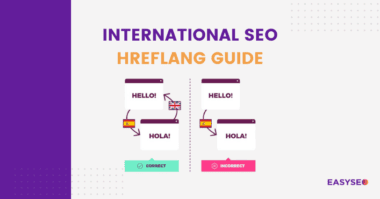SEO Services
Understanding The Importance Of Ssl Certificates For Seo
In the world of online business, search engine optimization (SEO) is a crucial aspect of achieving success and growth. SEO techniques help websites rank higher on search engine results pages (SERPs), improving visibility and attracting more traffic. However, there is one aspect…
Understanding Website Crawling And Indexing For SEO
Website crawling and indexing are crucial components of search engine optimization (SEO). Understanding how these processes work can help website owners and digital marketers optimize their websites for better visibility and ranking on search engine results pages (SERPs). We will explore the…
The Role Of Http Headers In Technical Seo
HTTP headers are an essential component of web communication and play a crucial role in technical SEO. They provide information to web browsers and servers about how to handle requests and responses, which makes them important for optimizing website performance and user…
Website Architecture And Url Structure For Seo Success
Search engine optimization (SEO) is an essential component of website development that influences a site’s visibility and ranking in search engine results pages (SERPs). One crucial element of SEO is website architecture and URL structure, which determine how search engines and users…

How to Use Hreflang Tags For International SEO And Language Targeting
Hreflang tags are HTML attributes that indicate to search engines which language and region a webpage is intended for. By using hreflang tags, businesses can improve their search engine rankings and ensure their website is properly targeted to the right audience. International…
Using Seo-Friendly Urls For Improved Visibility And Ctr
In the ever-evolving landscape of Search Engine Optimization (SEO), there are numerous strategies and techniques to improve the visibility and click-through rate (CTR) of a website. One of the often-overlooked factors in this process is the URL structure of a website. URLs…
Tips For Optimizing Site Navigation And Internal Linking
Website navigation and internal linking play a crucial role in enhancing user experience, increasing website traffic, and improving search engine rankings. An intuitive navigation menu and well-placed internal links can guide users to relevant content and help them quickly find what they…
Understanding And Managing Xml Sitemap Errors For Seo
XML sitemaps have become a crucial aspect of search engine optimization (SEO) strategies. They are a type of file that provides search engines with a roadmap of a website’s structure and content. By submitting an XML sitemap to search engines, website owners…
The Role Of Internal Search Functionality In Seo
Internal search functionality has become an integral part of modern websites, allowing users to easily find the information they are looking for within a website. The implementation of this functionality has become increasingly important for search engine optimization (SEO) as well, as…
The Importance Of Mobile-First Indexing For Seo
Mobile devices have become a crucial part of our daily lives, and they have transformed the way we consume content and interact with the digital world. As a result, search engines have adapted to this shift in user behavior by prioritizing mobile-first…
The Impact Of Schema Markup On Search Engine Results
In the world of search engine optimization (SEO), schema markup has emerged as a powerful tool for improving search engine rankings. Schema markup is a type of structured data that provides search engines with more information about the content on a webpage….
The Importance Of HTML And XML Sitemaps For SEO
Sitemaps play an integral role in search engine optimization (SEO) by providing a clear and organized structure of a website’s content. The use of sitemaps helps search engine crawlers navigate a website more efficiently, ultimately leading to better visibility in search engine…
The Role Of Hierarchy And Breadcrumbs In Site Structure And Seo
Site structure is a critical aspect of website development that has a significant impact on both user experience and search engine optimization (SEO) outcomes. A well-designed site structure not only enables users to navigate through the website easily but also helps search…
Strategies For Handling URL Parameter And Query String SEO Issues
In the world of search engine optimization (SEO), website owners must be vigilant about every aspect of their online presence. One area that can often be overlooked is the use of URL parameters and query strings. While these elements can be useful…
The Impact Of Mobile Usability On Seo And Rankings
Mobile devices have become an integral part of our daily lives, and with the increasing number of users accessing the internet through their smartphones and tablets, it has become crucial for businesses to have mobile-friendly websites. In fact, mobile devices now account…
The Impact Of User Experience (Ux) On Technical Seo
Technical SEO is a critical aspect of website optimization that focuses on the technical aspects of a site’s architecture, such as its code structure, page load speed, and mobile responsiveness. While technical SEO is essential for achieving high search engine rankings, it…
The Impact Of Website Speed On Seo Rankings
The speed of a website is a crucial factor in determining its search engine optimization (SEO) rankings. Website speed is a measure of how fast web pages load and respond to user requests. The faster a website loads, the more likely it…
The Role Of Canonical Tags In SEO And Duplicate Content Handling
Canonical tags are essential elements in search engine optimization (SEO) to avoid duplicate content issues that can harm a website’s ranking. Duplicate content refers to identical or nearly identical content that appears on different web pages, which can confuse search engines and…

The Importance Of Technical SEO For Website Success
Technical SEO is an essential component of website optimization that involves improving the technical elements of a website to enhance its visibility, usability, and ranking on search engine results pages (SERPs). Technical SEO focuses on the backend components of a website, including…
Seo Strategies For E-Commerce Websites And Product Pages
The increasing popularity of e-commerce has made it a highly competitive industry. With the rise of online shopping, businesses need to ensure that they have a strong online presence. Search engine optimization (SEO) is crucial for e-commerce websites and product pages to…
Seo Considerations For Website Migrations And Redesigns
Website migrations and redesigns can be exciting times for businesses looking to update their online presence and stay ahead of the competition. However, such changes can also have a significant impact on a website’s search engine optimization (SEO) and ultimately, its visibility…
Optimizing Website Architecture For Crawling And Indexing Efficiency
Website architecture plays a significant role in the ranking and visibility of a website on search engines. The structure of a website determines how easily search engine crawlers can access and index its pages. Poor website architecture can lead to slower indexing…
Optimizing Website Performance For Better Seo Rankings
Optimizing website performance is crucial for achieving better search engine rankings. With over 1.7 billion websites on the internet, ensuring that your website stands out among the competition is essential. One way to do this is by improving website performance, as search…
Optimizing Server Response Time For Improved Seo Performance
When it comes to improving search engine optimization (SEO) performance, businesses often focus on content optimization, keyword research, and link building strategies. However, these efforts can only go so far if the website’s server response time is slow. Server response time refers…
Seo Techniques For Voice Search Optimization
As technology continues to evolve, so do the ways in which people search for information online. One of the most significant shifts in recent years has been the rise of voice search, which allows users to search the internet using spoken commands…
Seo Best Practices For Multilingual And Multiregional Websites
The internet has made it easier for businesses to reach out to potential customers from different countries and regions. With this, multilingual and multiregional websites have become increasingly popular. However, optimizing such websites for search engines can be a complex process. Search…
SEO Considerations For Dynamic And Ajax-Driven Websites
The current trend in web development is towards dynamic and AJAX-driven websites that offer a more interactive user experience. However, these types of websites present unique challenges when it comes to search engine optimization (SEO). In order to rank well in search…
Seo Techniques For Javascript-Heavy Websites
SEO techniques for JavaScript-heavy websites have become increasingly important in recent years, as more and more websites rely on JavaScript to deliver dynamic and interactive content to their users. However, JavaScript poses unique challenges for search engine optimization, as search engines have…
Javascript Seo: Optimizing Javascript For Search Engines
JavaScript is an essential programming language used extensively in web development to enhance website functionality and user experience. However, it can also have a significant impact on search engine optimization (SEO). Unoptimized JavaScript can negatively affect a website’s search engine visibility and…
Implementing Structured Data Markup For Enhanced Search Results
Structured Data Markup is an important aspect of Search Engine Optimization (SEO) that can enhance the visibility and relevance of website content in search engine results pages. Structured Data Markup, also known as Schema Markup, involves the use of a standardized format…
Leveraging Crawl Budget Optimization Techniques For Seo
Search Engine Optimization (SEO) is a crucial aspect of digital marketing that helps businesses generate organic traffic to their websites. One of the critical elements of SEO is ensuring that search engines can efficiently crawl and index your website’s pages. Crawl Budget…
Leveraging Caching And Content Delivery Networks (Cdns) For Seo
In today’s digital landscape, website speed has become a critical factor for search engine optimization (SEO). Faster loading websites can improve the user experience, decrease bounce rates, and ultimately lead to higher search engine rankings. Caching and Content Delivery Networks (CDNs) are…
Optimizing Navigation Menus And Mega Menus For Seo
Navigation menus and mega menus are critical elements of website design that can significantly impact a website’s user experience and search engine optimization (SEO). A well-structured navigation menu can help visitors easily find the content they are looking for, while also providing…
Optimizing Images For SEO And Improved Page Load Speed
Optimizing images for search engine optimization (SEO) and improved page load speed is a critical aspect of website development. Images are essential for enhancing the visual appeal of a website and conveying information to visitors, but they can also slow down page…
Mobile Optimization: Best Practices For Technical Seo
Mobile optimization has become a crucial aspect of search engine optimization (SEO) due to the increasing number of people using mobile devices to access the internet. Mobile devices have become the primary means of accessing the internet, with more than half of…
Leveraging Structured Data For Rich Snippets And Knowledge Graphs
Structured data is a powerful tool that webmasters can use to improve their website’s visibility and search engine rankings. By providing search engines with clear, structured information about the content on their site, webmasters can help search engines understand the context and…
Leveraging Accelerated Mobile Pages (Amp) For Seo Success
Accelerated Mobile Pages (AMP) is an open-source initiative designed to create faster-loading mobile web pages. With the increasing number of mobile users, it has become crucial to improve website speed and optimize user experience on mobile devices. AMP provides a solution to…
Dealing With Duplicate Content: Strategies And Canonicalization
Duplicate content is a persistent issue that arises in the realm of search engine optimization (SEO) and website management. The duplication of content across various pages of a website or on different websites can lead to a decrease in search engine rankings…
Essential HTML Tags For SEO Optimization
In the world of search engine optimization (SEO), the importance of HTML cannot be overstated. HTML, or Hypertext Markup Language, is the backbone of every website and plays a crucial role in determining how search engines rank and display content. As such,…
Dealing With Site Speed Issues: Diagnosis And Solutions
Site speed is an essential aspect of website usability and user experience. Slow site speed can lead to frustration, reduced engagement, and ultimately, diminished conversions. Therefore, it is vital to diagnose and solve site speed issues to ensure a positive user experience…
Dealing With Pagination And SEO: Best Practices And Techniques
Pagination is an essential aspect of website design that enables users to navigate through large amounts of content with ease. However, when it comes to search engine optimization (SEO), pagination can pose significant challenges. Poorly implemented pagination can lead to duplicate content…
Implementing Open Graph And Twitter Card Markup For Social Sharing
This article explores the implementation of Open Graph and Twitter Card markup for social sharing. Open Graph and Twitter Card markup are two essential tools that allow website developers to optimize their content for social media sharing. Open Graph markup provides structured…
Best Practices For Handling 404 Error Pages And Redirects
The internet is comprised of millions of web pages that are constantly being updated, moved, and deleted. As a result, it is common for users to encounter 404 error pages, which indicate that the requested page is not available. These errors can…
Best Practices For Handling Site Migration Without Seo Impact
Site migration is a common practice among businesses and website owners looking to revamp their online presence. However, the process of migrating a site can be complex and risky, particularly when it comes to search engine optimization (SEO). An improperly executed site…
Best Practices For Implementing Pagination In Seo-Friendly Manner
Pagination refers to the process of dividing content into separate pages, with each page typically containing a specific amount of information. This technique is often used to organize large amounts of data, making it easier for users to navigate through the content….
Best Practices For Handling Soft 404 Errors And Error Pages
In the world of website management, one of the most common issues that webmasters face is the handling of errors. Among them, Soft 404 errors and error pages are probably the most frustrating ones. Soft 404 errors occur when a webpage is…

A Comprehensive Guide To xml Sitemaps For SEO
XML sitemaps are an essential component of search engine optimization (SEO) as they provide a roadmap for search engine crawlers to navigate a website’s pages and content. In essence, an XML sitemap is a file that lists all the URLs on a…

What Affects Website Speed?
Website speed is an important factor in determining the success of a website. It is essential for a website to load quickly and efficiently to ensure user satisfaction. Check WordPress website speed optimization services → Website speed is determined by several factors,…

What is Robots.txt? Everything you need to know
Robots.txt – is an important text file that determines how a search engine accesses your website. Within the file, there are directives, which specify which website pages are allowed or disallowed for a search engine to access. Setting the file up correctly…
